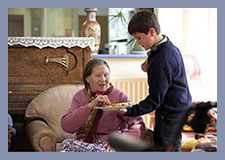
Like us on Follow Us on
Follow Us on  Caregiver Blog
Caregiver Blog![]()
Dealing With Resistance
Caring for the elderly can be challenging — particularly if a loved one is resistant to care. Understand what's causing your loved one's resistance and how you can encourage cooperation.
One of the toughest challenges you can face when caring for the elderly is resistance to care. How do you help a loved one who doesn't want help? Understand how resistance to care can develop and strategies for fostering cooperation when caring for the elderly.
What causes resistance to care?
If your loved one is in need of care, he or she is likely dealing with loss — physical loss, mental loss, the loss of independence. Accepting care may mean relinquishing privacy and adjusting to new routines. As a result, your loved one may feel frightened and vulnerable, angry that he or she needs help or guilty about the idea of becoming a burden to family and friends. In addition, your loved one may be stubborn, have mental health concerns or simply think it's a sign of weakness to accept help. He or she might also be worried about any associated costs.
What's the best way to approach a loved one
about the need for care?If you suspect that your loved one will be resistant to care — whether from family, other close contacts or a service — you may be hesitant to bring up the topic. To start communicating with your loved one about his or her need for care:
Choose a time when you and your loved one are relaxed. This will make it easier for you and your loved one to listen to each other and speak your minds.
What are the most effective strategies for
managing resistance to care?
Getting an aging loved one to accept help can be difficult. To encourage cooperation, you might:
Keep in mind that these strategies may not be appropriate when dealing with a loved one who has dementia.
What else can be done?
If your loved one continues to resist care and is endangering himself or herself, you may need to take steps to protect his or her health and safety. Consider consulting a lawyer about elder care issues.
Resistance to care is a challenge that many caregivers face. By keeping your loved one involved in decisions about his or her care and explaining the benefits of assistance, you may be able to help your loved one feel more comfortable about accepting help.
Visiting a Person with Dementia
Visiting family and friends with dementia is important for their emotional wellbeing.
However people with dementia are usually not able to initiate activities or ‘entertain’ you, the visitor.
Here are a few tips you may find useful when visiting your friend or family member, whether they live at home or in residential care.
OUR STORY
A Family Reflection And A Promise Kept
THE CAREGIVER ROLE
What is a Caregiver
The Caregiver Defined
Who Do Caregivers Care For
Accepting the Reality of Dementia
6 Steps to Successful Caregiving
Caregiver's Are Not Alone
Asking For & Getting Help
The Caregiver Code
Rights of a Caregiver
General Suggestions
Unmet Needs Of A Caregiver
Caregiver And Work
Feelings And Caregiver Stress
Questions & Answers
Notable People
STRESS, COPING & FEELINGS
The Caregiver Code
Rights of The Caregiver
Coping With Stress
Feelings And Caregiver Stress
Stages Of Alzheimer's
Helping Children Understand
Caregiver Burnout
Protecting Yourself From Burnout
Making Time For Reflection
Moving On
How is Competency Defined?
Power of Attorney
What is an Advanced Directive?
Do I Really Need a Will or a Trust?
COMMUNICATION
Importance of Communication
Communicating With Someone Who Has Alzheimer's
Your Approach Sets The Tone
Think Before You Speak
Doing Tasks Together
Having Trouble Being Understood
Keeping a Dementia Journal
Making Caregiving Easier - Caregiver Notebook
Things NOT To Do
When It Just Fails
ALZHEIMER'S BASICS
What is Alzheimer's
Why is Alzheimer's Different
Stages of Alzheimers
Can Alzheimers be Inherited
Statistics
The Mortality Question
TIPS AND ISSUES
New To Family Caregiving?
Tips For Dealing with Aggression
Places To Turn For Caregiver Supoort
Take Advantage of Community Support
Random Tips From Other Caregivers
Providing Long Distance Care
When To Stop Driving
Dealing With Family
Conflict
Tips on Sundowning
Ways to Reduce Sundowning Challenges (part A)
Ways to Reduce Sundowning Challenges (part B)
Helping Children Understand
Pet & Toy Therapy
Fixations
Getting Someone to Take Medications
Tips For Medical Appointments
Dealing With Resistance
Tips For Day To Day
Intimacy And Sexuality
Visiting A Person With Dementia
Music And Dementia
Tips For Holidays And Gatherings
Art as Home Therapy
PROBLEM SOLVING
What Can I Do To Be A More Effective Caregiver
Planning Tips
Dealing with False Dementia Accusations
Responding to Common Dementia Accusations
Steps to Effective Problem Solving
PROBLEM BEHAVIOURS
Anger
Hallucinations / Paranoia
Incontinence
Bathing
Dressing
Eating
Sleeping
Repetitive Actions
Verbal / Screaming
Wandering
Wanting to 'Go Home'
RESEARCH & DONATIONS














